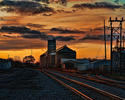Heartland
Among farmers in western Africa, the passion for agriculture runs deep. Kwabena (Koby) Yeboah farms near the village of Gomoa Adumase about 45 minutes outside of Accra, Ghana in West Africa, driven by his focus and intent to succeed.
Koby started farming five years ago at the age of 22. “I love the outdoors, working with my hands and making things grow,” he says.” I also enjoy hunting too, anything to be outside.” It’s a familiar refrain you’ll hear from almost any farmer you visit in North America. It’s all about the outdoors and a certain respect for the land. (Photo) read more »
Like a massive tornado, the Great Recession up-ended the topography of America. But even as vast parts of the country were laid low, some cities withstood the storm and could emerge even stronger and shinier than before. So, where exactly are these Oz-like destinations along the road to recovery? If you said Kansas, you’re not far off. Try Oklahoma. Or Texas. Or Iowa. Not only did the economic twister of the last two years largely spare Tornado Alley, it actually may have helped improve the landscape. read more »
The harvest of this year’s U.S. corn crop is about 90 percent complete, and it is going to be a bin-buster. If it surpasses 2009's astonishing 13.1 billion bushels, it could become the largest in U.S. history. American farmers are growing more corn today than at any time in the past, and the trend is accelerating. The last five years have brought us five of the largest corn crops ever. Where to store the stuff is becoming an issue: When the bins and elevators are full, the corn is simply piled on the ground. read more »
At 0.5 people per square mile, Harding County, South Dakota is one of the least populated places in the nation. The county’s only high school, located in Buffalo, is small by even small-town standards, with 85 students in grades 9-12. However, few schools can match its gridiron success. Nicknamed after the primary industry in the region, “The Ranchers” football team has experienced only one losing season in its 44-year history.
Harding County’s teenage boys suit up every Friday night and dominate 9-man football.
Nine-man football is a small-town sport. Unique to three upper Great Plains states (South Dakota, North Dakota, and Minnesota), it was designed read more »
California has pending legislation, AB 2529, to require an economic impact analysis of proposed new regulation. Its opponents correctly point out that AB 2529 will delay and increase the cost of new regulation. There will be lawsuits and arguments over the proper methodology and over assumptions. It is not easy to complete a thorough and unbiased economic impact analysis.
Should California incur the costs and delays of economic impact studies? read more »
When Brent Richardson, a field rep for Cadillac, was told he'd been transferred to Des Moines, he assumed he'd be spending the next year in a small town environment. Des Moines turned out to have much more bustle than he expected. The city had a robust insurance sector among its diverse industries. And the lifestyle was very similar to what he was able to live in big city suburbs like Naperville, Illinois or Bellingham, Massachusetts. Steeped in a decade of Farm Aid concerts, he also expected the surrounding rural areas to be populated with hardscrabble homesteaders struggling to hang on. Instead, he discovered that farming was big business – and, these days in particular, reasonably profitable. And some of those Iowa farmers turned out to be Cadillac buyers. read more »
Sarah Palin has emerged as the right's sweetheart, a cross between a pin-up girl and Joan of Arc. For some activists, like the American Thinker's Lloyd Marcus, she's "my awesome conservative sister" who the mainstream media wants to "destroy at any cost."
On a more serious note, leading right-wing pundit Roger Simon argues Palin's is now the biggest name in Republicandom, which he admits is not too great an accomplishment. Armed with "something more than intellect," he praises her unique ability to "connect with the base." He also believes, citing some polls for 2012, that she could run a close race against President Obama. read more »
The human world is fast becoming an urban world -- and according to many, the faster that happens and the bigger the cities get, the better off we all will be. The old suburban model, with families enjoying their own space in detached houses, is increasingly behind us; we're heading toward heavier reliance on public transit, greater density, and far less personal space. read more »
Yesterday marked the opening of the outrageous phenomenon known as the Sturgis Motorcycle Rally, a week-long, $987 million party for about 500,000 people. Every year in early August my sleepy hometown, Sturgis, population 6,500, hosts a half million biking enthusiasts who swarm here for a combination carnival, racing event, party, music festival, and shopping mall. read more »
by Anonymous 08/01/2010
Over the past few years resort communities - communities ideal for a ski vacation, a beach week, a hiking excursion or the like - have been hard hit by the downturn in real estate.
The key question is how these communities can be revived. If the issues involved are successfully addressed head-on, these small towns are able to provide significant amounts of affordable housing, viable and productive public transportation networks, and public functions such as parks, schools, police, and fire, despite limited financial and physical resources. read more »
|





















